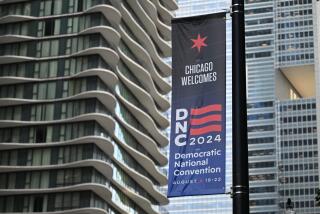The Other Guys’ Gift to the GOP
- Share via
Without a Republican casting a single vote, the GOP has won the first battle of the 2004 election. The Democratic National Committee has set up a plan allowing states to hold their primaries and caucuses in February, immediately after the first-in-the-nation Iowa and New Hampshire contests.
The DNC is fighting the battles of presidential elections past. With these new rules, Democrats may be laying the groundwork for future defeat.
The DNC’s complaint was that by going dark for five weeks after the 2000 New Hampshire primary, the Democrats ceded the spotlight to the Republicans. In addition, in states such as South Carolina where the Republican primary was held in February, voters were confused, turnout was down and states and parties had to foot the bill for two contests. Harmonizing the calendars, the DNC says, would correct this problem. Yet these nominating calendars were created to serve the interests of the two parties, and in 2000, that was to protect their respective front-runners.
For the GOP, this meant avoiding the mistakes of 1996, when Bob Dole went broke winning primaries and was effectively silenced until federal funds were available to him after the Republican convention. So the GOP front-loaded the process, and its front-runner, George W. Bush, didn’t accept matching funds, enabling him to spend a record amount of money.
For the Democrats, protecting the front-runner meant clearing the way for Al Gore by taking the bounce out of New Hampshire. Remember that, in September 1999, polls showed that Bill Bradley led in the Granite State. But Gore secured a narrow victory. Creating a five-week gap without a primary left Bradley--and whatever momentum he had--with nowhere to go.
But the lessons of 2000 make no sense for 2004. Here’s why:
* In 2004, the Democrats will face an incumbent Republican president who will have virtually unlimited money as well as the bully pulpit to dominate the airwaves. Having the media follow Democratic candidates as they travel from contest to contest may be the only way to keep Bush from dominating the headlines.
* No Democrat can do what Bush did in 2000 and refuse public campaign funds without committing political suicide. So even if the primary scrap ends early, the Democratic nominee would lack the money to compete with Bush before the convention in August.
* By accelerating the front-loading trend, Democrats create a situation in which only those who can raise $30 million and build a national network can compete. If there’s only one or two of these candidates, as in 2000, then a quick contest can lead to a quick conclusion. But it looks like 2004 could have four or five candidates--Gore, House Minority Leader Richard A. Gephardt of Missouri and Sens. Joseph I. Lieberman of Connecticut, John F. Kerry of Massachusetts and John Edwards of North Carolina--who can meet this standard. It’s not beyond the realm of fantasy that it could take a brokered convention to sort things out.
Unlike the GOP, the Democratic Party allocates its delegates proportionally: Candidates who poll at least 15% in a state receive the same percentage of delegates. A group of candidates with approximate national strength and specific regional appeal could win enough delegates to keep anyone from getting the two-thirds of pledged delegates needed for nomination. With the rest of the delegate votes in the hands of unpledged “superdelegates,” Democrats could find themselves spending the summer horse-trading ambassadorships, not battling Bush.
*
Kenneth S. Baer, former senior speech writer to Vice President Al Gore, is an adjunct professor of government at Georgetown University. Adam D. Sheingate is an assistant professor of political science at Johns Hopkins University.
More to Read
Get the L.A. Times Politics newsletter
Deeply reported insights into legislation, politics and policy from Sacramento, Washington and beyond. In your inbox twice per week.
You may occasionally receive promotional content from the Los Angeles Times.










